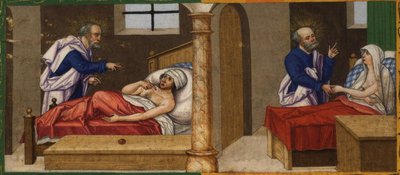Thoughts for the Day
Saturday, 24th April 2021: The name of Jesus - 1
Holy Spirit Jesus Christ Name of Jesus Acts 9 Peter
Reading : Verses from Acts, Chapter 9

Meanwhile the church throughout Judea, Galilee, and Samaria had peace and was built up. Living in the fear of the Lord and in the comfort of the Holy Spirit, it increased in numbers.
Now as Peter went here and there among all the believers, he came down also to the saints living in Lydda. There he found a man named Aeneas, who had been bedridden for eight years, for he was paralysed. Peter said to him, 'Aeneas, Jesus Christ heals you; get up and make your bed!' And immediately he got up. And all the residents of Lydda and Sharon saw him and turned to the Lord.
(Church in Wales Lectionary, New Revised Standard Version)
Thoughts
Often we hear people using the words 'Jesus Christ' as swear words, and we should have the courage to ask them not to use His name in this way, and gently explain why.
In the New Testament we read again and again that we should ask God for help 'in the name of Jesus Christ'. Jesus himself says we should ask "in my name" (John 16.23), and Matthew says we are to baptize in his name (Matthew 28.19). The name 'Jesus' means 'salvatiion', and although many men are called 'Jesus' this particular name was given to His son by God.
When Peter heals Aeneas who has been paralysed for eight years, notice he says, "Aeneas, Jesus Christ heals you." Names in Judaism have spiritual meanings, they infer the nature, the character, and the very essence of the person named. In other words we might say that names have power. So the name of Jesus (meaning 'salvatiion') and Christ (meaning 'Anointed One', ie the Messiah/Son of God) is used by Peter to heal Aeneas. I love the practical command to 'get up and make your bed' afterwards!
So when you close your prayers with 'in the name of Jesus Christ' you are asking with His authority.
Prayer
Lord Jesus,
You have taught us to say
our prayers in Your name.
May we truly appreciate what we are asking
when we request Your help,
and may we use Your name with respect.
Amen.
If you would like to explore this subject a little more, look up: